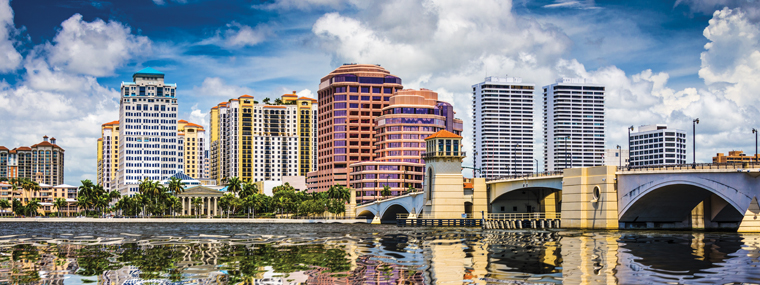
Rembaum’s Association Roundup
From One Disaster to the Next
Hurricane Season Starts June 1
By Jeffrey A. Rembaum, Esq. / Published May 2020

If the effects of the COVID-19 virus were not enough, June 1 begins Florida’s unenviable hurricane season. Never has it been more important to board members and managers to understand the emergency powers approved by the legislature and codified into Florida Statutes in Chapters 718, 719, and 720 for use during a declared “state of emergency.” Many associations have already utilized these powers in their efforts to curb the COVID-19 virus from spreading. If you are not yet familiar with these powers, well, you need to become learned before disaster strikes.
The statutorily required prerequisite to utilizing the emergency powers is that the Governor of the State of Florida has declared a “state of emergency.” Importantly, when exercising emergency powers, there should be a rational relationship between the action undertaken and the disaster itself. For example, an emergency special assessment needed to fix the condominium roof damaged by a hurricane during a state of emergency makes good sense. However, just because there was a hurricane and a state of emergency declared does not mean the emergency powers can be used to levy a special assessment to build a new gazebo, most especially when there was never a gazebo before.
The COVID-19 situation illustrates to many seasoned community association lawyers that the emergency powers granted by the legislature were drafted for use in response to, and for preparation for, natural disasters. More specifically, “in response to damage caused by an event for which a state of emergency is declared.” Suffice it to say, use of the emergency powers to help contain a virus epidemic was likely not contemplated. Nevertheless, circumstances warranted that the emergency powers be utilized during the COVID-19 crisis for which a state of emergency was indeed declared. Likely, as a result of the COVID-19 virus, the community association emergency powers granted by the Florida legislature will be tweaked by the legislature in its next session to provide for better applicability to an ever-evolving world where states of disaster are not limited to weather events alone.
The specific emergency powers legislation can be found in section 718.1265 Florida Statutes for condominium associations, section 720.316 Florida Statutes for homeowners associations, and section 719.128 Florida Statutes for cooperative associations. While each is very similar, there are a few subtle differences that go beyond the scope of this article. Also, it should be noted that an association can amend its governing documents to prohibit a board member’s use of the statutory emergency powers. Perhaps, one justifiable reason to do so would be if the membership approves its own version of emergency powers, which most obviously should be discussed with the association’s legal counsel before considering to do so.
A few of the emergency powers that are common to all of Florida’s community associations, unless otherwise provided, include the following:
- Conduct board meetings and membership meetings with notice given as is practicable under the circumstances.
- Cancel and reschedule any association meeting.
- Name as “assistant officers” persons who are not directors, which assistant officers shall have the same authority as the executive officers to whom they are assistants during the state of emergency to accommodate the incapacity or unavailability of any officer of the association.
- Relocate the association’s principal office or designate alternative principal offices.
- Enter into agreements with local counties and municipalities to assist counties and municipalities with debris removal.
- Implement a disaster plan before or immediately following the event for which a state of emergency is declared which may include, but is not limited to, shutting down or off elevators; electricity; water, sewer, or security systems; or air conditioners.
- Based upon advice of emergency management officials or upon the advice of licensed professionals retained by the board, determine any portion of the property unavailable for entry or occupancy by unit owners, family members, tenants, guests, agents, or invitees to protect the health, safety, or welfare of such persons.
- Require the evacuation in the event of a mandatory evacuation order.
- Based upon advice of emergency management officials or upon the advice of licensed professionals retained by the board, determine whether the property can be safely inhabited or occupied.
- As to condominiums, mitigate further damage, including taking action to contract for the removal of debris and to prevent or mitigate the spread of fungus, including but not limited to mold or mildew, by removing and disposing of wet drywall, insulation, car pet, cabinetry, or other fixtures on or within the condominium property, even if the unit owner is obligated by the declaration or law to insure or replace those fixtures and to remove personal property from a unit.
- As to condominiums, contract, on behalf of any unit owner or owners, for items or services for which the owners are otherwise individually responsible, but which are necessary to prevent further damage to the condominium property. In such event, the unit owner or owners on whose behalf the board has contracted are responsible for reimbursing the association for the actual costs of the items or services, and the association may use its lien authority provided by s. 718.116 to enforce collection of the charges. Without limitation, such items or services may include the drying of units, the boarding of broken windows or doors, and the replacement of damaged air conditioners or air handlers to provide climate control in the units or other portions of the property.
- As to homeowners associations, mitigate further damage, including taking action to contract for the removal of debris and to prevent or mitigate the spread of fungus, including mold or mildew, by removing and disposing of wet drywall, insulation, carpet, cabinetry, or other fixtures on or within the association property.
- Regardless of any provision to the contrary and even if such authority does not specifically appear in the declaration of condominium, articles, or bylaws of the association, levy special assessments without a vote of the owners.
- Without unit owners’ approval, borrow money and pledge association assets as collateral to fund emergency repairs and carry out the duties of the association when operating funds are insufficient.
Please be sure to review the legislation that is specifically applicable to your type of association, be it a condominium, cooperative, or homeowners association, as the above powers were presented for purposes of this article. These emergency powers are limited to that time reasonably necessary to protect the health, safety, and welfare of the association and the unit owners and the unit owners’ family members, tenants, guests, agents, or invitees and shall be reasonably necessary to mitigate further damage and make emergency repairs. Bear in mind prior to taking any action that consultation with the association’s attorney is an absolute must as this article is intended to provide useful information for consideration and not specific legal advice. Stay safe!
Jeffrey Rembaum
Partner, Kaye Bender Rembaum
Attorney Jeffrey Rembaum has considerable experience representing countless community associations that include condominium, homeowner, commercial, and cooperative associations throughout Florida. Every year since 2012, Mr. Rembaum has been inducted into the Florida Super Lawyers. Together with his partners, attorneys Robert Kaye and Michael Bender, their law firm, Kaye Bender Rembaum, is devoted to the representation of community and commercial associations throughout Florida. Kaye Bender Rembaum, with offices in Palm Beach, Broward, and Hillsborough Counties (and Miami by appointment), provides their clients with an unparalleled level of personalized and professional service. For more information, visit kbrlegal.com.




